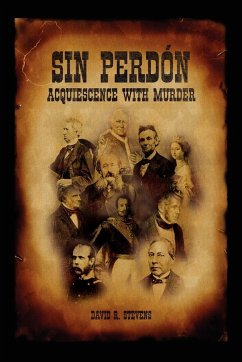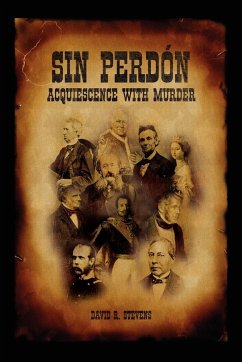
Sin Perdón
Acquiescence With Murder-Volume 1
Versandkostenfrei!
Versandfertig in 1-2 Wochen
24,99 €
inkl. MwSt.
Weitere Ausgaben:

PAYBACK Punkte
12 °P sammeln!
While fire-eaters, both North & South, fanned controversial flames into open, armed hostilities, the political situation south of the 1860 US-Mexico border also quickly deteriorated. Prior to opening shots at Fort Sumter, Liberal Republican President Benito Juarez wrested power away from the clerical Conservatives who had held the country in a oppressive grip since before Spain's embarrassing evacuation. Juarez's election, and subsequent persecutions, prompted affluent expatriate Conservatives to flee to Europe, where, as political refugees, they gained the sympathies of France's Napoleon III....
While fire-eaters, both North & South, fanned controversial flames into open, armed hostilities, the political situation south of the 1860 US-Mexico border also quickly deteriorated. Prior to opening shots at Fort Sumter, Liberal Republican President Benito Juarez wrested power away from the clerical Conservatives who had held the country in a oppressive grip since before Spain's embarrassing evacuation. Juarez's election, and subsequent persecutions, prompted affluent expatriate Conservatives to flee to Europe, where, as political refugees, they gained the sympathies of France's Napoleon III. Seeing the turmoil brewing in the US, Napoleon, backed by some of Europe's most influential bankers, gambled and embarked on a mission of regaining a foot-hold on the western continent that had been lost since the publication of the US's Monroe Doctrine. This Napoleon accomplished by convincing Austria's Archduke Maximilian in accepting the "Crown of Mexico," which would be propped-up by French expeditionary forces. However, when the devastating US turmoil concluded with the subjugation of the South, US Secretary of State, William Seward, issued a threatening ultimatum demanding Napoleon to withdraw French troops from Mexico, or face the consequences of war with the United States. With the final embarkation of the French Foreign Legion from the coastal port of Vera Cruz, it was only a matter of time before Maximilian realized his puppet-government could not survive without exterior military support. Convinced that forging peaceful, political alliances with the victorious North was his only formula for successful existence, Maximilian spurned the overtures of displaced, unrepentant southern generals offering their services. Seward, however, rejected Maximilian's proposals. With his stunningly beautiful bride having returned to Europe to seek the reestablishment of withdrawn monetary and military support from governments and the Vatican, Maximilian made his last stand against converging loyal Juaristas at an old Spanish town north of that republic's capital.













